
1905 Birth: Felix Bloch:
Swiss-born American physicist who shared (with independent discoverer, E.M. Purcell) the Nobel Prize for Physics in 1952 for developing the nuclear magnetic resonance (NMR) method of measuring the magnetic field of atomic nuclei. He obtained his PhD under Werner Heisenberg in 1928, then taught briefly in Germany, but as a Jew, when Hitler came to power, he left Europe for the USA. Bloch's concept of magnetic neutron polarization (1934) enabled him, in conjunction with L. Alvarez, to measure the neutron's magnetic moment. During WW II he worked on the atomic bomb. Thereafter, Bloch and co-workers developed NMR, now widely used technique in chemistry, biochemistry, and medicine. In 1954 he became the first director of CERN.
1914 World War I Various:
Battle of Yser: On the 23rd of October the first French reinforcements arrived on our left, and on the 24th the six Belgian divisions were supported by one French division and a few battalions of Territorials. On the night of the 23rd a furious attack upon Dixmude was repelled by the Marine Fusiliers (whose heroism will forever remain legendary, and with justice) and a couple of Belgian regiments. This was the sixth time that the German army had attacked Dixmude within a week, and at each of these repeated assaults there were frightful hand-to-hand combats and hecatombs of dead; and each time our valiant soldiers remained masters of the field. The area conquered by the Germans on the 23rd, lying within the bend of the Yser between Schoorbakke and Tervaete, was violently bombarded and recaptured. Here it was that a notebook was found on a German corpse. [For further details, Click here]
World War I An officer-correspondent, in action at Ypres, writes in the Norddeutsche Zeitung:Eager for the fight and certain of easy victory, the young men of the regiment marched off "to catch the English", as our soldiers said. Everybody was firmly convinced that God had given the English long legs so that they could run all the faster . . . . We thought of portrayals in our newspapers and humorous magazines of [Sic] . . . . [All] we faced was an army of mercenaries [fighting not] for love of Fatherland or sacrificial courage, but for a few pence a day.

On the morning of 23 October between 7 and 9 o'clock, our troops arrived in Lille . . . . There had been lengthy delays. For long hours the trains stood immobile at open stretches, then crawled forward from station to station at a snail's pace of 8 kilometers per hour. After a few hours, as Lille approached, unbroken cannon fire was heard, in the Westerly direction of Armentièeres, fliers were seen circling in the brightly illuminated sky—one already felt the vicinity of the Front.
From Adolf Hitler's Hepp Letter:After a really lovely journey down the Rhine, we reached Lille on October 23. We could already see the effects of the war as we traveled through Belgium. We saw the conflagrations of war and heard its ferocious winds. As far as Douai, our journey was reasonably safe and quiet. Then came shock after shock. In some places, the base artillery had been destroyed in spite of the strongest defense. We were now frequently coming upon blown up bridges and wrecked locomotives. Although the train kept going at a snail's pace, we encountered more and more horrors: graves. Then in the distance we heard our heavy guns.

Click to Enlarge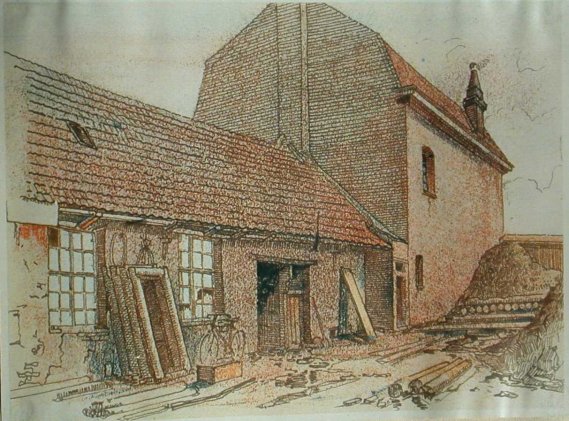
Fromelles Watercolor, 1915, by Hitler
1915 World War I (Oct 4, 1915 - Feb 29, 1916): Gefreiter Adolf Hitler's serves with 16 Reserve Infantry Regiment at Fromelles. [For further details, Click here.]
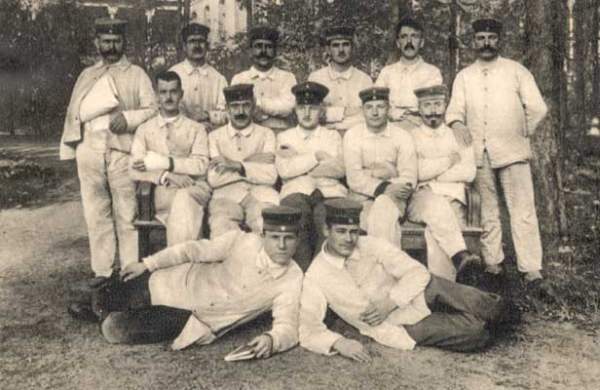
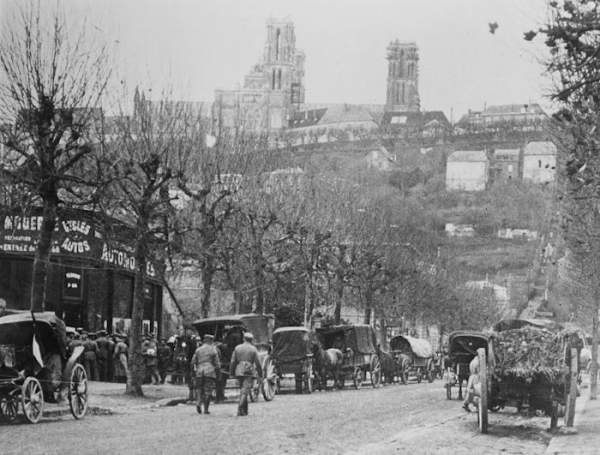

1918 World War I: Various:
President Wilson insists that the United States and the Allies not negotiate an armistice with the existing military dictatorship of Germany.
Mesopotamia: (Iraq), a British force under Lt. Gen. A. S. Cobbe pushes northward from Baghdad to secure the Mosul oil fields before the Turkish collapse.
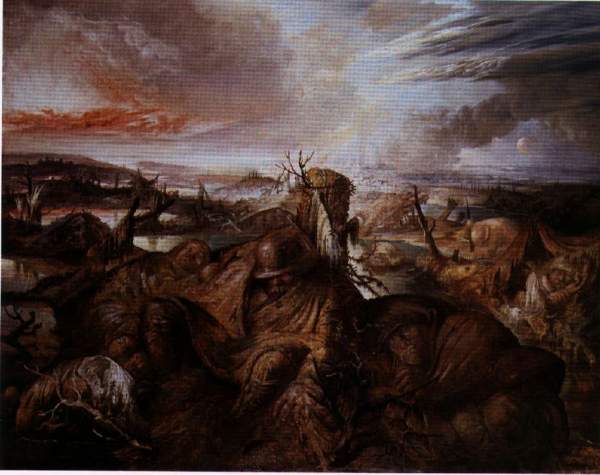
World War I (Oct 15 - Nov 10): Gefreiter Adolf Hitler, blinded in a gas attack near Werwick on Oct 14, recovers in the Prussian Reserve Hospital at Pasewalk near Berlin. The doctors at this army hospital, on the cutting edge of medical treatments for gassed soldiers, provide Hitler with very good care, and his sight slowly and painfully begins to return to him over these few weeks. Hitler falls into a deep depression. After over four years on the front lines, his fighting days are over. In four years of war, the List Regiment has lost 3,754 dead, 8,795 wounded, with 678 taken prisoner. This is somewhat above the average for the German Armed Forces as a whole.
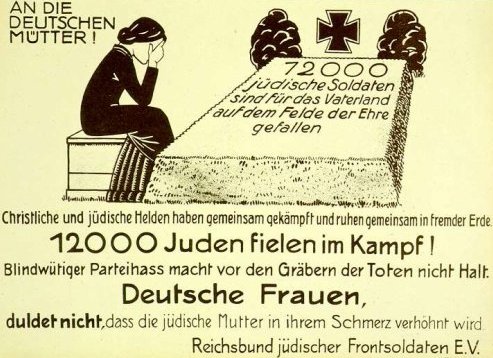
Throughout the length of the war, fifty-nine Jews served in the List Regiment, sixteen of these as officers. Thirty percent of the Jews in the List Regiment were honored for bravery, and seventeen percent were killed in action.[For further details, Click here.]
1921 Unknown Soldier is selected: In the French town of Chalons-sur-Marne, an American officer selects the body of the first "Unknown Soldier" to be honored among the approximately 77,000 United States servicemen killed on the Western Front during World War I. [For further details, Click here]
1923 Weimar: Chancellor Stresemann demands the resignation of the Communist Government in Saxony and the restoration of the authority of the Reich in Bavaria. (THP)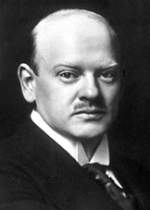
A month after the armistice of November 11, 1918, Stresemann formed the German People's Party, was elected to the national assembly which gathered at Weimar in 1919 to frame a new constitution, was elected to the new Reichstag in 1920 and spent the next three years in opposition. From August 13 to November 23, 1923, Stresemann was chancellor of a coalition government. In his short-lived ministry he dealt firmly with insurrection in Saxony, restored order in Bavaria after Hitler's Putsch failed, ended the passive resistance of Germans in the Ruhr to the French occupying forces, and began the work of stabilizing Germany's currency. [For further details, Click here]

1929 Wall Street: After a steady decline in stock market prices since the peak in September, the New York Stock Exchange begins to show signs of panic.
1933 Holocaust: Martin Buber and 51 other Jewish educators are fired from their positions at German universities.
1934 Countdown to Infamy: The Naval Disarmament Conference is held in London:
The restrictions of the Versailles Treaty were a bar to the development of strength in all the fields necessary if Germany were to make war. Although there had been an increasing amount of circumvention and violation from the very time that the Versailles Treaty came into effect, such operations under disguise and subterfuge could not attain proportions adequate for the objectives of the Nazis. To get the Treaty of Versailles out of the way was indispensable to the development of the extensive military power which they had to have for their purposes. It was as a part of same plan and for the same reason that Germany withdrew from the Disarmament Conference and from the League of Nations. It was impossible for the Nazis to carry out their plan on the basis of existing international obligations or on the basis of the orthodox kind of future commitments. [For further details, Click here]
1937 Nazis and Nazi sympathizers in Danzig stage a massive pogrom:

By 1937, however, economic considerations began to play a secondary role in determining the Danzig regime's policy towards Jews. The only moderating force was a German desire to avoid any direct confrontation with Poland over Danzig. Thus the party officially disassociated itself from a mob assault on Jewish businesses and homes (October 23, 1937) and even imposed prison terms on some of the rioters.58 Yet the anti-Semitic agitation continued and the regime introduced new anti-Jewish measures. By 1937, some three thousand of the more than ten thousand resident Jews had already left Danzig, and for the first time some community leaders began considering an at least partial evacuation of Jews from the city.59 Administrative pressure for the Aryanization of businesses coupled with stormtrooper-enforced boycott activity made things harder and harder for Jews. From November 1937 to the summer of 1938, another two thousand Jews left the city. [For further details, Click here.]
1939 World War II: From the Völkischer Beobachter: Churchill Sank the Athenia:
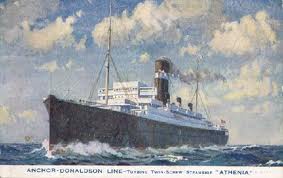
The above picture shows the proud Athenia, the ocean giant, which was sunk by Churchill's crime. One can clearly see the big radio equipment on board the ship. But nowhere was an SOS heard from the ship. Why was the Athenia silent? Because her captain was not allowed to tell the world anything. He very prudently refrained from telling the world that Winston Churchill attempted to sink the ship through the explosion of a time bomb. He knew it well, but he had to keep silent. Nearly 1,500 people would have lost their lives if Churchill's original plan had resulted as the criminal wanted. Yes, he longingly hoped that the 100 Americans on board the ship would find death in the waves so that the anger of the American people, who were deceived by him, should be directed against Germany, as the presumed author of the deed. It was fortunate that the majority escaped the fate intended for them by Churchill. Our picture on the right shows two wounded passengers. They were rescued by the freighter City of Flint, and as can be seen here, turned over to the American coast guard boat Gibb for further medical treatment. They are an unspoken accusation against the criminal Churchill. Both they and the shades of those who lost their lives call him before the tribunal of the world and ask the British people, 'How long will the office, one of the richest in tradition known to Great Britain's history, be held by a murderer?
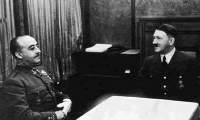
1940 World War II: Hitler and Generalissimo Franco—the Spanish head of state—meet at Hendaye near the French-Spanish border. Franco is non-committal regarding Spain's entry into the war on the side of Germany.
1941 World War II: Various:
Soviets switch commanders in drive to halt Germans:
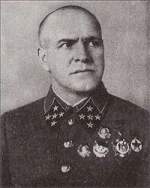
On this day in 1941, chief of the Soviet general staff, Georgi K. Zhukov, assumes command of Red Army operations to stop the German advance into the heart of Russia.
Zhukov's military career began during World War I, when he served with the Imperial Russian Army. He then joined the Red Army in 1918, taking time off to study military science in both the Soviet Union and Germany. By the outbreak of World War II, Zhukov was commander of the Soviet forces stationed on the Manchurian border and led a counteroffensive that beat back the Japanese attack in 1939.
By the time of the German invasion of Russia, Zhukov had been promoted from chief of staff of the Soviet army during the "winter war" against Finland, to commander in chief of the western front. It was in this capacity that he now prepared to beat back the German invaders, first from Moscow, and then from central Russia altogether. He would eventually be promoted to general and become a key player in the planning or execution of virtually every major Soviet engagement until the end of the war. Ultimately, he would represent the USSR at Germany's formal surrender and take command of the Soviet occupation of Germany.
Stalin's wise choice in handing so much power and responsibility to this one man was regretted only after the war, when Zhukov's popularity threatened his own. Stalin "rewarded" the general with obscure positions that wasted his talent and kept him out of the spotlight. Zhukov was finally made minister of defense after Stalin's death in 1953 in Premier Nikita Krushchev's new government. But as the military attempted to remove itself from the iron grip of internal Communist Party politics, Zhukov, who supported autonomy for the army, began to butt heads with the premier, who wanted to keep the Red Army under the Central Committee's collective thumb.
Ironically, when the Presidium, the "conservative" (in this case, Stalinist) legislative body that opposed certain "democratic" reforms proposed by Krushchev, attempted to push the premier from power, it was Zhukov who flew Central Committee members to Moscow to tip the balance of power and keep Krushchev's position secure. As a reward, Zhukov was made a full member of the Presidium, the first professional soldier ever to hold such an office (it also served to have a man who proved himself loyal on a body that was otherwise hostile). But Zhukov's renewed attempt to free the army from party control resulted in his dismissal by Krushchev. Zhukov would once again be lost to public view—until Krushchev's fall from power in 1964. Zhukov would eventually win the Order of Lenin medal (1966) and publish his autobiography (1969). (History.com)
Holocaust: All Jewish emigration Nazi-occupied territory is officially halted. (THP)
Occupied France: To the Prefect of the Gironde, Bordeaux: As expiation for the cowardly murder of the Councillor of War, Reimers, the Military Commander in France has ordered 50 hostages to be executed. The execution will take place tomorrow. In case the murderers should not be arrested in the very near future, additional measures will be taken, as in the case of Nantes. I have the honor of making this decision known to you. Chief of the Military Regional Administration,"-signed" Von Faber Du Faur.
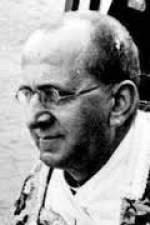
Church and Reich: Catholic Provost Bernhard Lichtenberg, who right through the stepped-up anti-Semitic agitation, continues to say a daily prayer for the Jews, is finally arrested. During questioning by Himmler's henchmen, the Provost asserts that the deportation of the Jews is irreconcilable with Christian moral law, and asks to be allowed to accompany the deportees as their spiritual adviser. He is sentenced to two years imprisonment for abuse of the pulpit (see November 5, 1943) (THP)
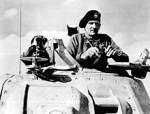
1942 World War II: Various:
North Africa: Field Marshal Montgomery begins his attack on El Alamein. After a 5-hour, thousand-gun artillery barrage. Two British columns move forward cutting a deep salient into the German lines. [For further details, Click here]
The Western Task Force—destined for North Africa—departs from Hampton Roads, Virginia.
1944 World War II: Various:
War in the Pacific: The Japanese fleet fails to destroy transports landing American soldiers on the island of Leyte during the Battle of Leyte Gulf.
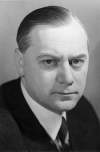
Church and Reich: Reich Foreign Minister Alfred Rosenberg writes to Party Secretary Martin Bormann proposing to draft the entire German clergy for forced labor because of severe manpower shortages. (THP)
1954 In Paris, an agreement is signed by Britain, England, France and USSR providing for West German sovereignty and permitting West Germany to rearm and enter NATO and the Western European Union.
1955 The Saar—an autonomous area—united economically with France, votes against closer ties with Paris. It will become German territory in 1957.
1956 Hungarian protest turns violent:
Thousands of Hungarians erupt in protest against the Soviet presence in their nation and are met with armed resistance. Organized demonstrations by Hungarian citizens had been ongoing since June 1956, when signs of political reform in Poland raised the possibility for such changes taking place in their own nation. On October 23, however, the protests erupted into violence as students, workers, and even some soldiers demanded more democracy and freedom from what they viewed as an oppressive Soviet presence in Hungary. [For further details, Click here]

1965: After publishing a number of articles, favorable to Werner von Braun, in Paris Match, the magazine receives stacks of mail, critical of the rocket scientist. Many of these letters are from members of a group called Friends of Deportees of the Dora-Ellrich Camps (Amicale des Camps de Dora-Ellrich). The letters point out that von Braun, being partly responsible for the suffering of the inmates at Dora, is hardly deserving of the celebrity status he has achieved. Von Braun answers his critics, in a defiant letter published in the magazine this day, stating that "As much as I understand their bitterness, I am appalled by their false accusations aimed at me." He points out that the US government had examined his background, and given him a clean bill of health; and that he is in no way responsible for the crimes of the Nazis. "I felt ashamed that things like this were possible in Germany," he claims, "even under a war situations [sic] where national survival was at stake." The editors of Paris Match are obviously satisfied with von Braun's denials, and the story soon disappears.
[See: Wunderwaffen: Hitler's Deception and the History of Rocketry.]Edited by Levi Bookin (Copy editor)
levi.bookin@gmail.com



Click to join 3rdReichStudies



Disclaimer: This site includes diverse and controversial materials--such as excerpts from the writings of racists and anti-Semites--so that its readers can learn the nature and extent of hate and anti-Semitic discourse. It is our sincere belief that only the informed citizen can prevail over the ignorance of Racialist "thought." Far from approving these writings, this site condemns racism in all of its forms and manifestations.
Fair Use Notice: This site may contain copyrighted material the use of which has not always been specifically authorized by the copyright owner. We are making such material available in our efforts to advance understanding of historical, political, human rights, economic, democracy, scientific, environmental, and social justice issues, etc. We believe this constitutes a "fair use" of any such copyrighted material as provided for in section 107 of the US Copyright Law. In accordance with Title 17 U.S.C. Section 107, the material on this site is distributed without profit to those who have expressed a prior interest in receiving the included information for research and educational purposes. If you wish to use copyrighted material from this site for purposes of your own that go beyond 'fair use', you must obtain permission from the copyright owner.
Please Note: The list-owner and the moderator of 3rdReichStudies are not responsible for, and do not necessarily approve of, the random ads placed on our pages by our web server. They are the unfortunate price one pays for a 'free' website.